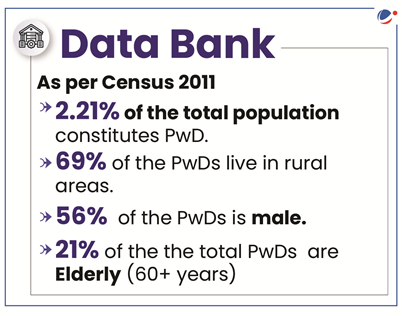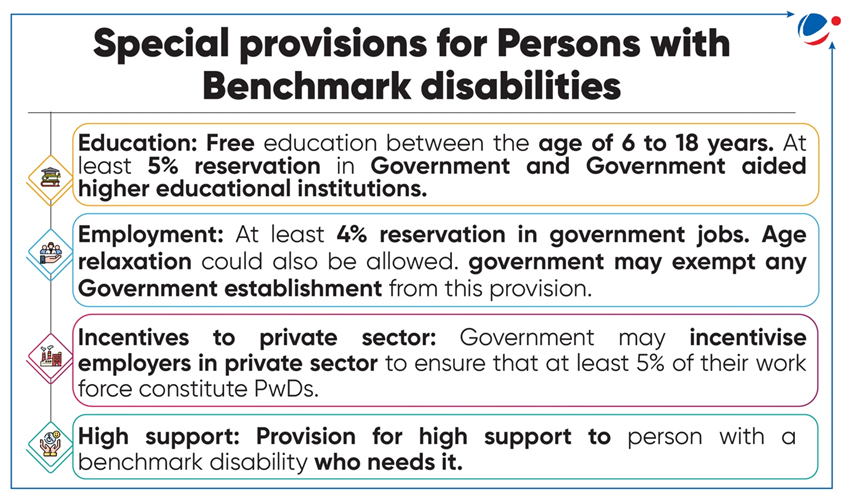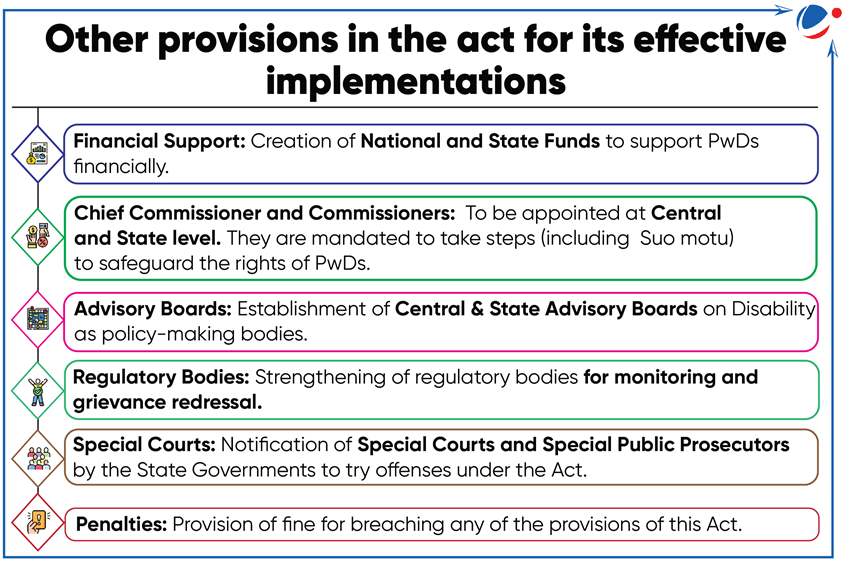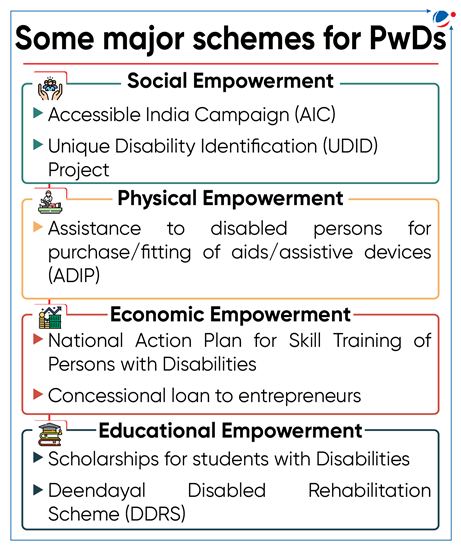Why in the News?
Recently, in the Seema Girija Lal & Anr Vs Union of India & Ors case the Supreme Court expressed disappointment at the inadequate implementation of the RPwD Act, 2016 across states.

More on News
- The Court noted that many states including Andhra Pradesh, Chattisgarh, UP, Punjab, Tripura, and UT of Chandigarh were lagging in the implementation of various provisions of the Act including:
- appointment of State Commissioners,
- creation of State Funds for PwDs,
- formation of assessment boards for disability certificates,
- establishment of Special Courts, etc.
- The court directed all such states to implement various provisions of the Act by June 30 while also directing the Ministry of Social Justice and Empowerment to update the court with a status of compliance.
About PWDs
- PwDs face stigma, discrimination, and neglect, due to prejudice and socio-psychological and cultural reasons, despite the Constitutional guarantee of equality of all citizens.
- Their abilities are often underestimated, leading to a vicious cycle of underachievement and hindering their growth.
About Rights of Persons with Disabilities (RPwD) Act, 2016
Background
- The Act aims to ensure that all PwDs can lead their lives with dignity, without discrimination and with equal opportunities.
- It was enacted to give effect to the United Nations Convention on the Rights of Persons with Disabilities (UNCRPD) of 2007, to which India is a signatory.
Key Provisions of the Act
- Definition of PwD: PwD refers to a person with long term physical, mental, intellectual or sensory impairment which, in interaction with barriers, hinders his full and effective participation in society equally with others.
- Disabilities recognized: Recognises 21 types of disabilities including acid attack victims, intellectual disability, mental illness, etc.
- Enumerates right of PwDs
- Governments are responsible for ensuring PwDs enjoy the right to equality, life with dignity and respect.
- Protection from abuse, cruelty, inhuman treatment, violence and exploitation, etc.
- Other rights include the right to home and family, reproductive right, accessibility in voting, the right to own or inherit property.
- Persons with Benchmark disabilities: It refers to person with at least 40% of a specified disability, whether defined in measurable terms or not as certified by the relevant authority.
- Guardianship: If a PwD cannot make legally binding decisions even with support, a limited guardian may be appointed. The District Court or designated authority may also grant total support to the person if needed or if repeated limited guardianship is necessary.
- Limited guardianship is a joint decision-making system based on mutual understanding and trust between the guardian and the PwD. It follows the PwD's will and is limited to specific periods, decisions, and situations.
- Social security: Mandates the government to formulate necessary programmes to safeguard the rights of PwDs for an adequate standard of living to enable them to live independently or in the community.

Reasons for sub-optimal implementation of the RPwD Act
- Inadequate allocation of resources: The Parliamentary Standing Committee in 2022-23 highlighted suboptimal budget allocation for PwD program.For example,
- between 2016-17 and 2020-21, number of components under the SIPDA increased from 6 to 13, whereas the budgetary allocation increased by less than 9%.
- Disability pension of ₹300 or 500 per month under Indira Gandhi National Disability Pension Scheme is provided which given the current state of inflation is too low.
- Coordination issues: Effective implementation requires active participation of states as well as districts and effective coordination between various departments and agencies, ensuring this is difficult.
- For example, the non-receipt of Utilisation Certificates from the State Governments has remained a recurring problem, which has resulted in non-release of funds for initiatives for PwDs by the Centre.
- Rehabilitation services
- 69% of the PwDs reside in rural areas where accessibility, availability, and utilization of rehabilitation services is inadequate.
- Under Deendayal Disabled Rehabilitation Scheme the present cost norms are not sufficient to get qualified rehabilitation professionals and there is a particular scarcity of professionals in remote areas.
- Hinderance in educational empowerment: Budgetary allocation for schemes meant for educational empowerment of PwDs has remained stagnant.
- Additionally, except the National Fellowship Scheme, no other targets were achieved.
- Lack of data and research: There is a lack of updated reliable and disaggregated data, which hinders evidence-based policymaking and targeted interventions.

Initiatives taken for PwDs
|
Way Forward
- Handholding to states: The Union ministry should guide state agencies with expert advice, targets, and resources to implement the Act's provisions effectively.
- Enhancing Collaboration: Foster collaboration across government bodies and with civil society, disability rights groups, and the private sector to promote the rights and inclusion of PwDs.
- Improve accessibility: Incorporate accessibility criteria in all central and state level procurement laws and policies in public procurement of physical, digital and transport infrastructure.
- Advancing impact assessment: Establish robust data systems to monitor the RPwD Act's implementation and assess its impact, while supporting relevant research to understand regional challenges faced by PwDs.
- Social audit: Section 48 of the Act requires the appropriate government to undertake a social audit of all general schemes and programmes involving PwDS. This provision needs to be implemented on a priority basis.




